 Petzlover
Petzlover Balinese is originated from Thailand but Oriental Bicolour is originated from United States. Both Balinese and Oriental Bicolour are of same weight. Balinese may live 5 years more than Oriental Bicolour. Both Balinese and Oriental Bicolour has same litter size. Both Balinese and Oriental Bicolour requires Low Maintenance.
Balinese is originated from Thailand but Oriental Bicolour is originated from United States. Both Balinese and Oriental Bicolour are of same weight. Balinese may live 5 years more than Oriental Bicolour. Both Balinese and Oriental Bicolour has same litter size. Both Balinese and Oriental Bicolour requires Low Maintenance.
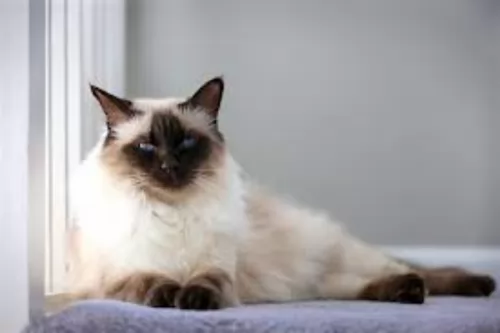 The slender Balinese cat is a cat similar in looks to the Siamese cat but fluffier. In fact, in the 1950s, Siamese breeders in the United States discovered that the kittens were fluffier than what a Siamese cat should be.
The slender Balinese cat is a cat similar in looks to the Siamese cat but fluffier. In fact, in the 1950s, Siamese breeders in the United States discovered that the kittens were fluffier than what a Siamese cat should be.
The fur was too long to conform to Siamese cat standards. Two Siamese breeders, Helen Smith and Marion Dorsey loved the look of the longer-haired Siamese with the idea being to name the breed the Longhair Siamese. Siamese breeders didn’t want this and the name became Balinese.
The Balinese cat has been recognized by many cat registries and associations.
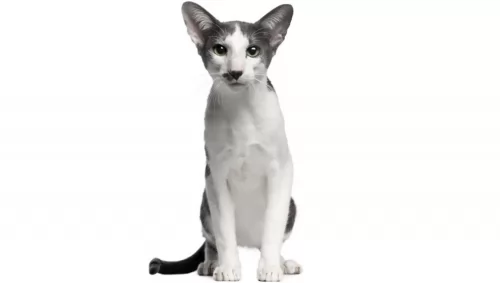 Oriental Bicolour cats owe their origins to Lindajean Grillo of Ciara Cattery. The cats hail from the United States. It was in 1979 that Grillo paired a Siamese and bicolored American Shorthair, selecting the best bicolored offspring to mate again with Siamese or Orientals.
Oriental Bicolour cats owe their origins to Lindajean Grillo of Ciara Cattery. The cats hail from the United States. It was in 1979 that Grillo paired a Siamese and bicolored American Shorthair, selecting the best bicolored offspring to mate again with Siamese or Orientals.
This particular variety was granted recognition in 1983 by TICA. It was during the 1980s that European breeders started their own Oriental bicolor breeding lines. The first modern Oriental Bicolours were imported to the UK during 2004.
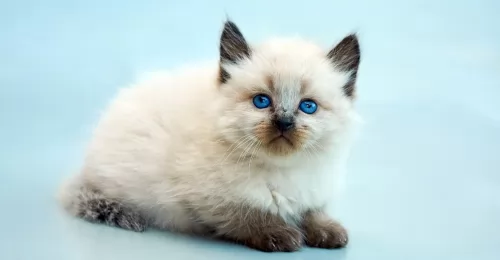 The medium-sized Balinese has a long, slender, finely built body with the head being long and triangular.
The medium-sized Balinese has a long, slender, finely built body with the head being long and triangular.
The eyes of the cat are slanted and a deep blue.
The coat is medium in length and is soft and silky without an undercoat. The coat length is pretty much all that distinguishes this cat from the siamese cat. The coat is pointed which means you’ll find concentrations of color – cream, red and tortoiseshell on the face, ears, legs and the plumed tail.
Your Balinese is a talkative cat and he is active and playful too. Because it is such an intelligent cat, it can learn tricks too.
They are affectionate cats and bond closely with their human family. They crave lots of attention and don’t like being left alone for long periods of time. They’re chatty cats too and love to leap up onto high perches and look down on their world.
If you have a Balinese as a pet, you will certainly have to invest in climbing equipment.
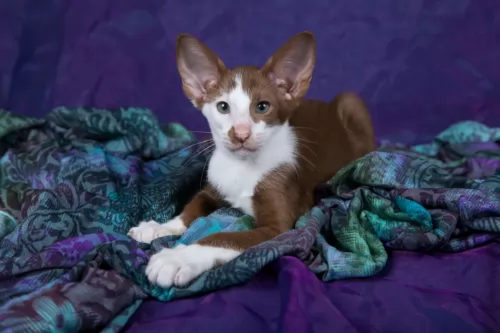 These cats with a triangular-shaped head and slender, long body have a fairly thin tail. The ears are widely set and are large. The eyes are green, but blue with the colorpoint varieties.
These cats with a triangular-shaped head and slender, long body have a fairly thin tail. The ears are widely set and are large. The eyes are green, but blue with the colorpoint varieties.
The coat is short, close-lying and sleek while the coat of the long-haired variety is fine and silky with no thick undercoat. The tail forms a plume. The coat is mostly white and the other part of the coat can be in any other color. You’ll always see quite a bit of white around the legs.
These cats are suited for singles, couples, families, and seniors - in fact, anyone still active enough to provide this cat with lots of attention.
These vibrant cats are known for their social, friendly and loving personality. They are intelligent, inquisitive, active cats that need to have plenty of interaction with their human family members. They love their human family and love to hold conversations with them.
They're entertaining too, and love nothing more to ve the center of attention. They're so into their human family that you may even have him waiting patiently for you to come home fro work. He shouldn't be left alone for hours on end and should rather have a pet friend to keep him company during the day.
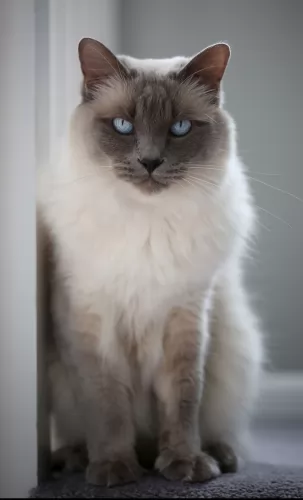 Your Balinese cat is a friendly, affectionate cat that will bond closely with his human family.
Your Balinese cat is a friendly, affectionate cat that will bond closely with his human family.
They’re the kind of cats that enjoy having their family members around them and they don’t like being left alone for long periods.
He is a playful cat so make sure that he has some nice toys that will keep him amused. They’re known for their intelligence and their inquisitive and playful natures, not to mention that these cats are easy on the eye as well.
Vocal and demanding, if you want someone who demands your friendship, then take a look at these beautiful Balinese cats.
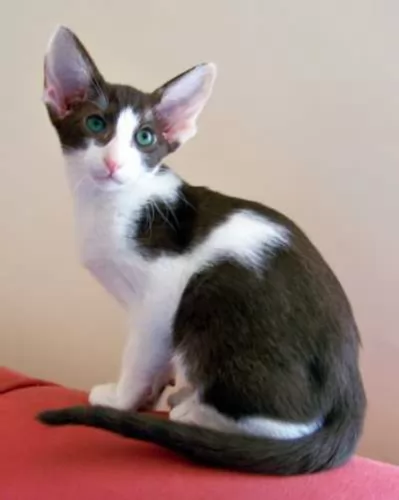 The Oriental Bicolor is such a wonderful pet to have. They are intelligent, entertaining, loving, active, playful, and inquisitive.
The Oriental Bicolor is such a wonderful pet to have. They are intelligent, entertaining, loving, active, playful, and inquisitive.
They’re also athletic and energetic. These cats have got all the characteristics you want in a good friend. They make a fantastic companion to people who are active and happy. They’re also very vocal and have a lot to say to their human family.
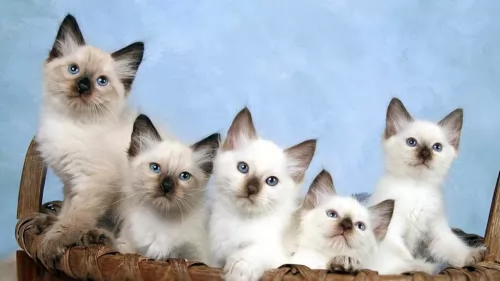 Balinese cats are fairly healthy and any health problems these cats may have are much the same as those for the Siamese cat.
Balinese cats are fairly healthy and any health problems these cats may have are much the same as those for the Siamese cat.
You want to look at diseases such as respiratory illnesses, liver failure, dilated cardiomyopathy, and eye problems.
In fact, Progressive Retinal Atrophy is one health condition that you see quite a bit with the Balinese cat.
It can be an inherited eye disease or one that is acquired. PRA is a degenerative disorder of the retina and you will need to get your cat to the veterinarian. Unfortunately, there isn’t a treatment for PRA and therefore breeders need to check their breeding stock before allowing cats to be bred.
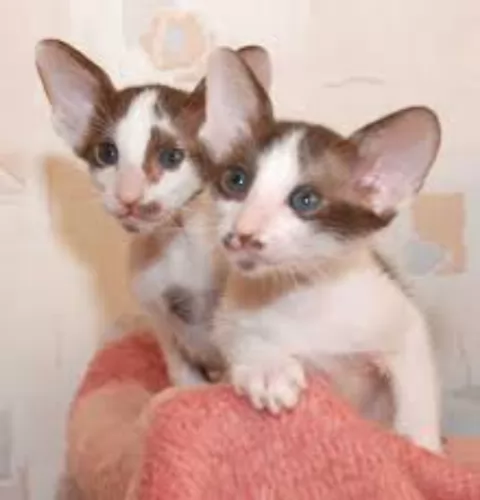 Any cat can develop health problems. Even kittens that come with a certificate of health can develop illnesses that you never thought possible.
Any cat can develop health problems. Even kittens that come with a certificate of health can develop illnesses that you never thought possible.
Orientals are generally healthy cats, but the health issues that may affect the Oriental are similar to that of the Siamese cat.
One of these is Progressive Retinal Atrophy (PRA). This is a genetic eye problem that can lead to blindness. Another disease to look out for is Asthma. The Siamese is susceptible to this disease which means your Oriental Bicolor will also be. You will have to get your furry friend to the vet who may precribe anti-inflammatory drugs.
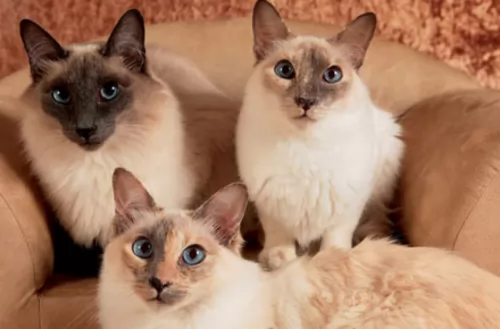 Your health depends on what you eat, and the same applies to cats too. Apart from good veterinary care for your cat, good food is of critical importance. A proper diet can eliminate veterinary expenses substantially.
Your health depends on what you eat, and the same applies to cats too. Apart from good veterinary care for your cat, good food is of critical importance. A proper diet can eliminate veterinary expenses substantially.
In feeding your cat, learn to read cat food labels and make sure your furry friend is getting the right amount of proteins, vitamins, and minerals.
There are many choices of cat foods – homemade and commercially manufactured cat foods which can be canned or you also get the dry cat kibble type of food.
If your furry friend doesn’t like a particular food, don’t punish him by taking it away and leaving him without food. Your mom tried you with different foods and you should do the same with your feline friend.
Provide your Balinese with ‘cat equipment’ - feeding and drinking bowls, grooming equipment and a nice, soft bed for him to lie in and in a quiet place.
Keep your pet’s vaccines up to date and see he gets to the vet when he is ill.
The Balinese has a coat of medium length and because the cat only really sheds seasonally, it is looked upon as a low-maintenance coat. A brush once a week will get rid of dust as well as loose, dead hair and keep the coat in good condition.
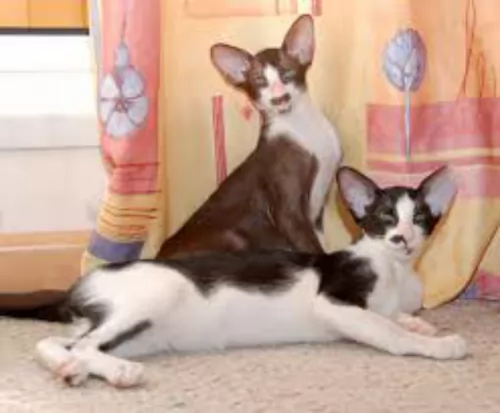 The Oriental Bicolor will require a brushing once a week. A good idea is to also take a warm, damp cloth and to wipe your cat down. It’s an excellent way to rid your cat of loose hairs as well as dust. The cat has a sparse coat, so brush him gently.
The Oriental Bicolor will require a brushing once a week. A good idea is to also take a warm, damp cloth and to wipe your cat down. It’s an excellent way to rid your cat of loose hairs as well as dust. The cat has a sparse coat, so brush him gently.
Other grooming requires nail clipping and checking inside his ears. If you clean his ears, be careful not to go deep into the ear. It is precisely why so many cat owners take their cat to the pet groomers where they can do these things professionally.
It’s very important to keep your Bicolor’s litter box spotlessly clean because like most cats, they won’t use their litterbox if it’s still got yesterday’s feces in it. It needs to be cleaned every day.
The Oriental’s diet is much like that of other cats – it has to be meaty. You can’t afford to not understand your feline pet’s dietary needs. Cats are carnivorous and they need commercial cat food that will be equal to fresh meat that they would normally find in the wild.
They need foods high in protein but they will still need some carbohydrates, amino acids, and vitamins, and minerals. Always go for the best quality pet cat foods because by buying the poorer quality ones you put your cat at risk of developing health problems. Never ever leave your cat without a constant supply of fresh, cool drinking water.
Supply your cat with all the things that make it a pleasure to have a cat. You don’t want to bring your pet home and only then start looking for things to make him at home. He’ll need food and water bowls, a nice warm, soft bed, a litter box, grooming accessories, collar, toys climbing tree and scratching pole.
Have your pet neutered or spayed to prevent unwanted kittens.
Make sure he is taken to the vet when ill. You shouldn't own a pet if you can't afford to pay vet fees. There are some cat illnesses that can make your cat very sick and uncomfortable. He should have his vaccines and also be treated for parasites.